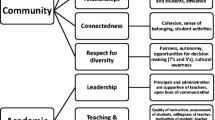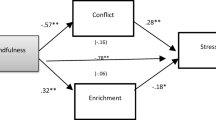Abstract
Emerging research has shown that the COVID-19 pandemic impacted the working conditions of educators and led to increased levels of stress, burnout, and turnover. Few studies, however, have examined changes in collegiality during the pandemic despite scholarship noting that educators experienced isolation as support systems weakened and collaboration with colleagues in school settings was reduced. In this essay, we discuss the impacts of the pandemic on educator collegiality by drawing upon survey data gathered from 758 educators in 38 public schools in New York State. Survey results show that COVID-19 related disruptions negatively impacted educators’ collegiality although these impacts differed in intensity by educator gender, role, mode of instruction, and years of experience. As educator collegiality is related to a range of positive influences on educators and students and has been shown to potentially mitigate burnout and turnover, it is crucial to better understand the impacts of the pandemic on collegiality and discuss strategies to support educator collegiality in the future.

Similar content being viewed by others
Notes
A detailed report on the methods and procedures used for this research is available on the researchers’ website (Wilcox et al., 2022b).
References
Alves, R., Lopes, T., & Precioso, J. (2021). Teachers’ well-being in times of Covid-19 pandemic: factors that explain professional well-being. IJERI International Journal of Educational Research and Innovation, 15, 203–217.
Barth, R. S. (2006). Improving relationships within the schoolhouse. Educational Leadership, 63(6), 8.
Bothma, C., & Roodt, G. (2013). The validation of the turnover intention scale. SA Journal of Human Resource Management, 11(1), 1–12.
Charmaz, K. (2006). Constructing grounded theory: A practical guide through qualitative analysis. Sage Publications.
Clarke, P. M., Fiebig, D. G., & Gerdtham, U. G. (2008). Optimal recall length in survey design. Journal of Health Economics, 27(5), 1275–1284.
Darling-Hammond, L. (2022). Breaking the legacy of teacher shortages. Educational Leadership, 80(2), 14–20.
Datnow, A. (2018). Time for change? The emotions of teacher collaboration and reform. Journal of Professional Capital and Community, 3(3), 157–172.
de Lima, J. Á. (2001). Forgetting about friendship: Using conflict in teacher communities as a catalyst for school change. Journal of Educational Change, 2(2), 97–122.
Diliberti, M., Schwartz, H. L., & Grant, D. M. (2021). Stress topped the reasons why public school teachers quit, even before COVID-19. RAND Corporation.
Fullan, M., & Hargreaves, A. (1996). What’s worth fighting for in your school? Teachers College Press.
Goddard, Y. L., Goddard, R. D., & Tschannen-Moran, M. (2007). A theoretical and empirical investigation of teacher collaboration for school improvement and student achievement in public elementary schools. Teachers College Record, 109(4), 877–896.
Guarino, C. M., Santibanez, L., & Daley, G. A. (2006). Teacher recruitment and retention: A review of the recent empirical literature. Review of Educational Research, 76(2), 173–208.
Hargreaves, A. (1994). Changing teachers, changing times: Teachers’ work and culture in the postmodern age. Teachers College Press.
Hargreaves, A., & Fullan, M. (2020). Professional capital after the pandemic: Revisiting and revising classic understandings of teachers’ work. Journal of Professional Capital and Community., 5, 327–336.
Hartney, M. T., & Finger, L.K. (2020). Politics, Markets, and Pandemics: Public Education’s Response to COVID-19. (EdWorkingPaper: 20–304). Retrieved from Annenberg Institute at Brown University.
Hauseman, C., Darazsi, S., & Kent, S. (2020). Collaboration, communication and wellness: Response to the COVID-19 pandemic in Manitoba schools. International Studies in Educational Administration, 48(2), 70–77.
IBM. (2020). “Can I compute “robust standard errors” in SPSS?” https://www.ibm.com/support/pages/can-i-compute-robust-standard-errors-spss
Jakubowski, T. D., & Sitko-Dominik, M. M. (2021). Teachers’ mental health during the first two waves of the COVID-19 pandemic in Poland. PloS one, 16(9), e0257252.
Jarzabkowski, L. (2000). A case study in collegiality. Leading and Managing, 6(1), 21–36.
Johnson, B. (2003). Teacher collaboration: Good for some, not so good for others. Educational Studies, 29(4), 337–350.
Johnson, S. M., Kraft, M. A., & Papay, J. P. (2012). How context matters in high-need schools: The effects of teachers’ working conditions on their professional satisfaction and their students’ achievement. Teachers College Record, 114(10), 1–39.
Kearney, C. A., & Childs, J. (2021). A multi-tiered systems of support blueprint for re-opening schools following COVID-19 shutdown. Children and Youth Services Review, 122, 105919.
Kelchtermans, G. (2006). Teacher collaboration and collegiality as workplace conditions. A review. Zeitschrift für Pädagogik, 52(2), 220–237.
Kim, L. E., & Asbury, K. (2020). ‘Like a rug had been pulled from under you’: The impact of COVID-19 on teachers in England during the first six weeks of the UK lockdown. British Journal of Educational Psychology, 90(4), 1062–1083.
Klapproth, F., Federkeil, L., Heinschke, F., & Jungmann, T. (2020). Teachers’ experiences of stress and their coping strategies during COVID-19 induced distance teaching. Journal of Pedagogical Research, 4(4), 444–452.
Kraft, M. A., Simon, N. S., & Lyon, M. A. (2021). Sustaining a sense of success: The protective role of teacher working conditions during the COVID-19 pandemic. Journal of Research on Educational Effectiveness, 14(4), 727–769.
Lawson, H. A., Durand, F. T., Wilcox, K. C., Gregory, K. M., Schiller, K. S., & Zuckerman, S. J. (2017). The role of district and school leaders’ trust and communications in the simultaneous implementation of innovative policies. Journal of School Leadership, 27(1), 31–67.
Leo, A., Wilcox, K. C., Khan, M., Mola, J. A., Holdsworth, E., & Tobin, J. (2022). Gendered impacts of the COVID-19 pandemic: A mixed-method study of teacher stress and work-life balance. Community, Work, & Family, 25(5), 682–703.
Little, J. W. (1982). Norms of collegiality and experimentation: Workplace conditions of school success. American Educational Research Journal, 19(3), 325–340.
Little, J. W. (1990). The persistence of privacy: Autonomy and initiative in teachers’ professional relations. Teachers College Record, 91(4), 509–536.
Love, S. M., & Marshall, D. T. (2022). Teacher experiences during COVID-19. In D. T. Marshall (Ed.), COVID-19 and the classroom: How schools navigated the great disruption (pp. 21–65). Lexington Books.
Marshall, D. T., Shannon, D. M., & Love, S. M. (2020). How teachers experienced the COVID-19 transition to remote instruction. Phi Delta Kappan, 102(3), 46–50.
McCarthy, C. J., Blaydes, M., Weppner, C. H., & Lambert, R. G. (2022). Teacher stress and COVID-19: Where do we go from here? Phi Delta Kappan, 104(1), 12–17.
Miles, M. B., Huberman, M. A., & Saldaña, J. (2014). Qualitative data analysis: A methods sourcebook (3rd ed.). Sage Publications.
Newberry, M., & Allsop, Y. (2017). Teacher attrition in the USA: The relational elements in a Utah case study. Teachers and Teaching, 23(8), 863–880.
Pogodzinski, B., Youngs, P., & Frank, K. A. (2013). Collegial climate and novice teachers’ intent to remain teaching. American Journal of Education, 120(1), 027–054.
Pressley, T., & Ha, C. (2021). Teaching during a pandemic: United States teachers’ self-efficacy during COVID-19. Teaching and Teacher Education, 106, 103465.
QSR International Pty Ltd. (2021). NVivo Version 12 Plus, https://www.qsrinternational.com/nvivo-qualitative-data-analysis-software/home
Shah, M. (2012). The importance and benefits of teacher collegiality in schools—A literature review. Procedia-Social and Behavioral Sciences, 46, 1242–1246.
Simon, N., & Johnson, S. M. (2015). Teacher turnover in high-poverty schools: What we know and can do. Teachers College Record, 117(3), 1–36.
Steiner, E. D., & Woo, A. (2021). Job-related stress threatens the teacher supply. Rand Corporation.
Vangrieken, K., Dochy, F., Raes, E., & Kyndt, E. (2015). Teacher collaboration: A systematic review. Educational Research Review, 15, 17–40.
Wilcox, K.C., Durand, F., Lawson, H., Leo, A., Schiller, K., Khan, M., & Mola, J.A., (in press). Educators’ job dissatisfaction and school leaders’ communications during the COVID-19 pandemic. Journal of School Leadership.
Wilcox, K. C., Leo, A., Khan, M., Tobin, J., Avila, J. A., Schiller, K., Durand, F., & Lawson, H. (2022b). Discovering impacts of the COVID-19 pandemic on the education workforce: Methods and procedures report. State University of New York.
Wilcox, K. C., Leo, A., Tobin, J., & Khan, M. (2022a). Opportunities and challenges to adapt and innovate: How educators confronted the COVID-19 pandemic. State University of New York.
Zhao, Y., & Watterston, J. (2021). The changes we need: Education post COVID-19. Journal of Educational Change, 22(1), 3–12.
Author information
Authors and Affiliations
Corresponding author
Additional information
Publisher's Note
Springer Nature remains neutral with regard to jurisdictional claims in published maps and institutional affiliations.
Appendix: Variables and descriptive statistics
Appendix: Variables and descriptive statistics
Variable | M / % | SD | Source and coding |
|---|---|---|---|
Female | 83 | "With which gender identity do you most identify?" Choices were: Male, Female, Non-binary, Transgender, Other, I prefer not to say. Dummy variable for female educators (equals 1 if female, 0 otherwise). | |
Log (Years of experience) | 2.54 | 0.74 | "How long have you worked in your profession?" Recategorized midpoints for 1.5 years, 4 years, 7.5 years, 16 years and 25 years. Years of experience were logged to adjust for skewness. |
Classroom teacher | 69 | "What is your primary role?" Dummy variable for 1 = "classroom teacher" (e.g., Mainstream/classroom /Core subject area teacher, Special subject area teacher, Special Education teacher or English New Language/Bilingual Education teacher) and 0 = "other educator" (e.g., Teaching assistant, Social worker or counselor, or administrator). | |
Collegiality pre-COVID (α=0.882) | 3.83 | 0.99 | "How frequently did you have the following interactions with others in your school prior to the pandemic (before March 2020)" Scale is average of the following statements coded 0 = never to 5 = everyday: I collaborated with my colleagues in planning and preparing instructional materials I shared what I learned from my teaching experiences I worked with colleagues to try out new ideas for engaging students. My colleagues and I discussed struggling students My colleagues and I shared strategies for communicating with students’ families |
Collegiality COVID year 2 (α=0.891) | 3.23 | 1.14 | How frequently have you had the following interactions with others in your school in this school year (Fall 2020-present)? Scale is average of the following statements coded 0 = never to 5 = everyday: I collaborate with my colleagues in planning and preparing instructional materials I share what I learn from my teaching experiences I work with colleagues to try out new ideas for engaging students My colleagues and I discuss struggling students My colleagues and I share strategies for communicating with students’ families |
Mode of student learning COVID year 2^ | |||
Fully remote | 7 | "I am currently working with students who are learning (select all that apply): Dummy variable for remote only (equals 1 if remote only, 0 otherwise) | |
Mixed remote & in person | 68 | "I am currently working with students who are learning (select all that apply):" Dummy variable for a combination of in-person and remote (equals 1 if remote and in-person combination, 0 otherwise) | |
Rights and permissions
Springer Nature or its licensor (e.g. a society or other partner) holds exclusive rights to this article under a publishing agreement with the author(s) or other rightsholder(s); author self-archiving of the accepted manuscript version of this article is solely governed by the terms of such publishing agreement and applicable law.
About this article
Cite this article
Schiller, K.S., Wilcox, K.C., Leo, A. et al. “I was on an Island”: COVID-19 impacts on educator collegiality. J Educ Change 24, 1099–1110 (2023). https://doi.org/10.1007/s10833-023-09489-3
Accepted:
Published:
Issue Date:
DOI: https://doi.org/10.1007/s10833-023-09489-3




